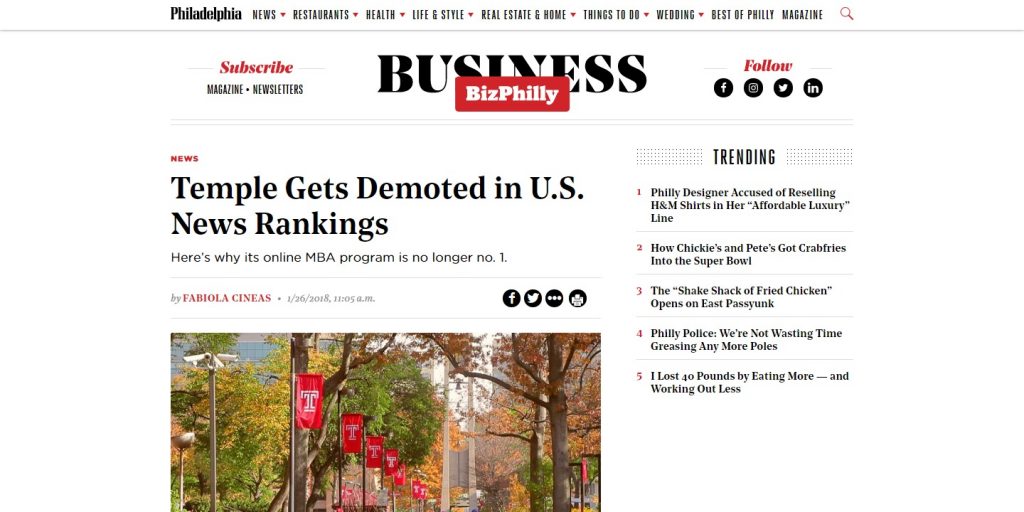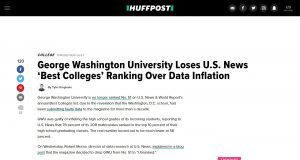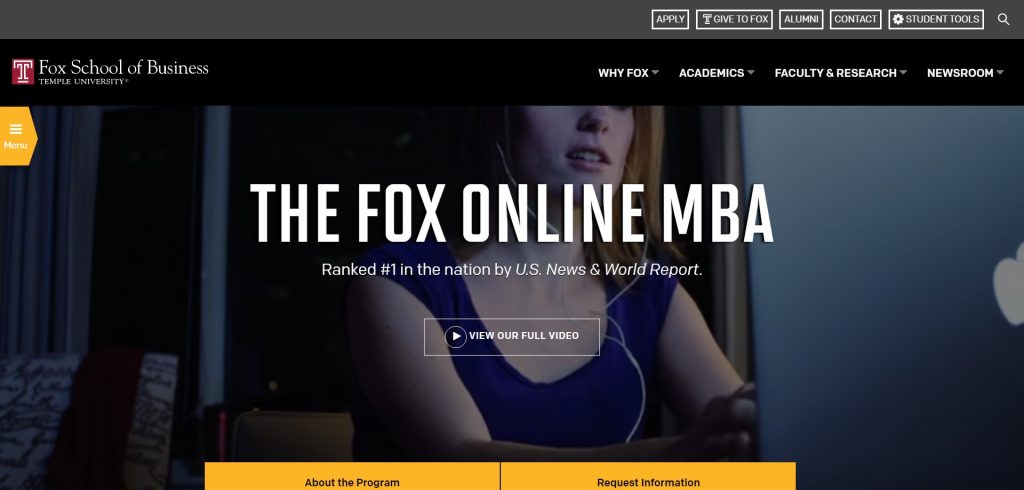The Best Healthcare Management Programs in Washington DC

Healthcare management is among the fastest growing jobs in the United States today. According to the U.S. Bureau of Labor Statistics, a 20 percent increase is expected for jobs the field of medical and health service management over the next ten years. Given that the average growth rate for all other occupations is just 7 percent, this reveals a significant boost expected within this field.
Given how quickly this field is growing, jobs in healthcare management can be competitive. One of the best ways to set yourself apart in the job market is with a specialized degree in healthcare management, demonstrating to employers that you have the specific skill set the job requires. If you are eager to join this growing industry, or looking for a career path that allows you to combine a passion for business with a love of medicine, you may want to pursue a degree in healthcare management.
Many business schools offer MBAs with specializations in healthcare management, or offer other options for customizing your degree to gain credentials in the field.
The Top Washington DC Healthcare Management MBA Programs.
George Washington University School of Business
The School of Business at the highly ranked George Washington University offers an online healthcare MBA program, which combines the generalized business foundation learned during the school’s MBA program with healthcare focused electives. The program explores the most important concepts in business and healthcare amidst a rigorous and hands-on educational environment. In addition to earning an MBA in healthcare management, students may also choose to pursue an additional certificate in fields like Clinical Research Administration, Clinical & Translational Research, Health Care Quality, Integrative Medicine, and more.
The online healthcare MBA at George Washington is 55.5 credit hours, divided among core courses (31.5) and healthcare focused electives (24), offered through the university’s School of Medicine and Health. Students may also petition to have 12 of their elective credits made up of GWU graduate-level healthcare courses outside of the medical school.
Just a few of the many healthcare elective courses offered through SOMHS are listed below:
- Patient Safety Systems
- Issues and Trends in Health Systems
- Introductions to Global Regulatory Affairs
- Regulatory Strategy in the Development of Drugs and Biologics
McDonough School of Business – Georgetown University
The McDonough School of Business at Georgetown University takes their healthcare and business education combo to a new level with the dual MBA and MD program. Within just five years, students will graduate with two degrees; one in medicine and one in business.
The program is broken down with different requirements each year, focused primarily on MD courses at the start, but including at least one MBA core course during the evening each semester. Students will take MBA elective courses throughout the fourth and fifth years, eventually completing the Global Business Experience in the final year. Students interested in the joint MBA/MD program at McDonough must be accepted both by the School of Medicine as well as McDonough before enrolling.

Georgetown University’s precious mascot, Jack, shortly after earning his degree at the School of Medicine / Photo via Georgetown
Student testimonials comment on the way the program has shaped their way of thinking and creatively problem solving. “I am confident that much of what I have gained at the business school will aid me in my career as a physician and will certainly enhance opportunities to improve the healthcare system as a physician-leader,” commented Mark Matza, MD/MBA 2014.
University of Maryland R.H. Smith School of Business
While the R.H. Smith School of Business at the University of Maryland does not offer an MBA concentration in healthcare management, they offer students the opportunity to jointly pursue an MBA and a Master of Science (MS) with a Health Services Leadership and Management specialty. The degree is designed to prepare students for a role as an administrator within a health care system, with the ability to make management-level decisions on a variety of fronts, including strategic planning, governance, and finance. The business education provided by the MBA will also provide students with a strong foundation in leadership and innovation that will allow students to take the lead in designing new approaches to healthcare services. Students with this degree could serve in a variety of roles within the healthcare field, such as a chief nursing officer, consultant, finance officer, and more.
The 68 credit program will be completed over the course of four years, with the MBA requirements mostly being completed in the first two years, and the MSN courses in years three and four.
Caught: Why Business Schools Might Lie to Improve Rankings

School rankings from sites like Forbes or U.S. News & World Report are often a crucial factor for students before they decide where they should pursue a degree. Using a combination of rankings, standardized test scores, job placement after graduation, and tuition costs, among other crucial factors, a school ranking a quick and succinct look at the relative merits and weaknesses of MBA programs throughout the country—and the world.
There is a lot riding on these rankings: not only do perspective MBAs often make decisions about where to pursue their degree based on these reviews, but graduates can use these rankings to demonstrate the quality of their degree to future employers. With such high stakes, organizations like U.S. News that compile these rankings rely on the accurate reporting of data from each business school.
So, what happens if the information is inaccurate, or worse? Data like student satisfaction and post-graduate salary—which can be so crucial in informing a prospective MBAs choice of school or program—is reported directly from the business schools, which often presents a conflict of interest potential. With so much at stake, would a school ever lie to increase their spot in the ranking?
Unfortunately, it seems the answer is yes. Just last week, the Online MBA program at Temple University’s Fox School of Business—a program that was consistently ranked in the top spot in U.S. News’ Online MBA ranking—vanished from the list. According to the initial announcement, new information had revealed that just 20 percent of Fox students in the Online MBA program had actually submitted test scores, a number that had initially been reported at a perfect 100 percent. Since the formula used by U.S. News weighs test score averages more if over 75 percent of students have submitted them, this inaccurate reporting from Temple Fox would have given the program an undeserved boost in the school ranking.

In the wake of Temple’s removal, questions continue to arise about the lengths schools go for good rankings/Photo via PhillyMag.
In the days since the initial announcement of Temple’s removal from the ranking, even more questions came out regarding the accuracy of Fox’s data. Further investigation found that Temple had reported 100 percent of students taking standardized admissions test for every year since 2014—a suspicious jump from the 25 and 33 percent that had been reported in the years prior. Since the test scores data submitted turned out to be inaccurate, it seems wholly possible that the data had also been misreported for the three years prior; the same years that Temple Fox held the top ranking for Online MBA programs.
This isn’t the first time it’s been discovered that business schools and even undergraduate programs have falsified or reported inaccurate data to boost its rankings. In 2013, Forbes was forced to remove four schools from its ranking of “America’s Best Colleges” due to inaccurate reporting: doctored SAT results from Bucknell University, false acceptance and graduation rates from Iona College, among others. In 2012, George Washington University lost its ranking on U.S. News’ “Best Colleges” list when it was discovered they were inflating the high school grades of their incoming students.

GWU was one of several schools in the past few years to submit false data for a rankings boost/via Huffington Post.
The problem may be even more far-reaching than some may suspect. In 2013, a survey of 576 college admissions officers found that 91 percent believed other colleges to be guilty of falsely reporting their admissions data. Even the school ranking creators themselves are shocked by this trend. In 2013, U.S. News editor Brian Kelly commented, “The integrity of data is important to everybody … I find it incredible to contemplate that institutions based on ethical behavior would be doing this.”
In 2005, the Association to Advance Collegiate School of Business (AACSB) took a deep look into this trend to examine why the issue of falsifying business school data might be so widespread. “Because rankings of full-time MBA programs are commonly presented under the label of ‘best b-schools,’ the public has developed a narrow definition about the breadth and value of business education,” the report states. Since most media rankings don’t consider factors like faculty research or doctoral education, MBA programs have become more likely to invest in more visible aspects of the program, such as facilities and marketing campaigns, which don’t actually deal with the quality of the degree. As a result, even high-quality programs may earn a lower media rank than they deserve based on the factors considered, adding pressure to do what it takes to earn a school ranking that matches what they perceive as the quality of the degree.
“Plenty of people apply to a school because it has reached the summit of a ‘best-of’ ranking, just as many people will see a movie or buy a book after it wins an award. That’s human nature,” Columbia Business School dean Glenn Hubbard told Fortune. “We want to experience the best.”
Whether or not placement in a school ranking truly represents the quality of a degree, it’s easy to see why the pressure is on for many admissions departments. A better school ranking can increase the number of applicants, providing for a more competitive, and diverse applicant pool, which creates a better quality admitted class. The cycle continues: success of these graduates can improve the possibility of future funding, providing more resources for the program and encouraging even more applicants to apply down the line.
“Rankings have become omnipresent in higher education, and they have enhanced the competition among institutions,” said Terry W. Hartle, senior vice president at the American Council on Education, in 2013. “And in any highly competitive environment, there is always a temptation to cut corners.”
For now, the Fox School of Business has been removed from the U.S. News Online MBA ranking. Concerns about false data continue to be evaluated, as organizations like AACSB continue to seek solutions and make recommendations for best practices when it comes to the collection and reporting of admissions data. In 2017, the AACSB publication “On Academic Rankings, Unacceptable Methods, and the Social Obligations of Business Schools,” suggested that schools and organizing bodies work together to find a method of data collection that includes “transparency, interpretability, and the empowerment of individual decision makers by whatever criteria truly suits their individual needs.”
For prospective students, its important to acknowledge this troubling but widespread trend as they make important decisions about where to earn a degree. While school ranking remains an easy way to compare programs against each other, students should consider not just the accuracy of the data but also the kind of factors reported in media rankings. While it seems possible that the number one program in a media ranking may not truly deserve that position, the real top program- the best for each individual’s needs and career goals—will always deserve first place.
BREAKING: U.S. News Removes Fox Temple From Online MBA Ranking

In some surprising news coming out of Philadelphia yesterday, the Temple University Fox School of Business Online MBA program—which had been named the best online offering in the country by U.S. News & World Report for the past four years—has been officially removed from the entire ranking due to misreporting admissions information.
According to Robert Morse and Eric Brooks, “the business school significantly overstated the number of new entrants for its 2016-2017 entering class who submitted GMAT scores. The misreported data resulted in the school’s numerical rank being higher than it otherwise would have been in the overall Best Online MBA Programs rankings and the Best Online MBA Programs for Veterans rankings.”
For the ranking, Fox Temple had originally reported that a remarkable 100 percent of applicants submitted GMAT scores for the survey. However, the school eventually informed the publication that only 50 out of 255 applicants actually submitted GMAT scores; less than 20 percent of the class.
Because of the infraction, the Fox School of Business will be completely removed from the 2018 ranking effective immediately. However, it will be eligible for re-entry on the 2019 ranking.
As of 4 p.m. EST, Fox Temple was still advertising its placement in the ranking on its main website.

Earlier this afternoon, Temple released a statement regarding the change, which contained the following:
Once we discovered the error, we took the proactive approach to promptly self-report in order to correct a mistake. The data submitted overstated the number of incoming Fox Online MBA students who had provided GMAT and GRE scores as part of the enrollment process. It was our hope U.S. News & World Report would recalculate its rankings based upon the submission of revised data. However, we accept the U.S. News & World Report decision.
The Fox Online MBA program still embodies all of the qualities of the nation’s top program, regardless of the revised 2018 ranking. Our program has a long-standing reputation as one of the nation’s best online MBA programs.
We are doubling efforts to verify our data before it is submitted for rankings purposes, and we have every expectation that the Fox Online MBA program will return to its rightful place among the nation’s top programs of its kind in 2019 and beyond. Rankings are a byproduct of quality, and our focus will remain where it always has—on delivering high-quality programs and service to our students.
To ensure the integrity of the Fox School’s reported data and reporting, the University is hiring an outside, independent firm to review all of our school’s data reporting processes, including what happened in this instance, and to make appropriate recommendations. I have directed the entire Fox School to cooperate fully with this review.
Fox losing its spot at the top of the rankings is not unheard of. In 2012, George Washington University lost its spot in the U.S. News general university rankings. However, GWU, at the time, was ranked 51st overall. Temple, in this instance, is suffering a much greater penalty for submitting false information.
Stay tuned for more information on the story as it unfolds.
The Secret To Finding An Affordable Washington DC MBA

Washington DC may be a top city for students pursuing their MBAs, but the city’s high cost of living could prove prohibitive for many young Mstudents. Growing rent prices over the past ten years have led DC to be one of the least affordable of the major U.S. metropolitan areas.
Of course, MBA students looking to apply their education to governmental agencies won’t find a better place to do so than in the nation’s capital. And though contending with high rent prices may be unavoidable, many business schools offer students a number of ways to keep the cost of their degree at a minimum.
From scholarships to grants and student work opportunities, business schools in Washington DC ensure that low-income applicants can have equal access to the high quality education their program’s provide. Below are just a few of the opportunities provided to assist low-income applicants at Washington DC MBA programs.
Finding An Affordable Washington DC MBA
McDonough School of Business – Georgetown University
Over $1.5 million in aid is available to MBA applicants through merit based scholarships at Georgetown University’s McDonough School of Business. All students are eligible for these grants, but it is advised to apply for the program early to best position yourself for consideration. International students in need of additional funding may also apply for external scholarships and private loans specifically for international students. The university has compiled a list of common lenders that students may want to consider here.
McDonough also provides scholarship opportunities through the Consortium, a group whose goal it is to reduce the under-representation of blacks, Native Americans, and Hispanic students in business education. As a member school, a number of scholarships are also available at McDonough for students admitted as part of the Consortium.
University of Maryland R.H. Smith School of Business
Roughly 85 percent of MBA students at UMD Smith receive merit based awards to help fund their education. Between scholarships, fellowships need-based awards and assistantship opportunities, students have a number of opportunities to reduce their tuition and keep their MBA affordable. Awards such as the Dean’s Award of Smith award provide two years and one-year of full scholarship and fees. Students may also find additional opportunities for scholarships through the university’s organizational partnerships, such as the Forté Foundation or management Leaders for Tomorrow.
YOU MAY ALSO LIKE: Georgetown McDonough Offers New FinTech Elective
George Mason University School of Business
The George Mason University School of Business provides one of the best values in education, demonstrated through the high success rate of alumni and the fact that Mason alumni have the lowest student loan default rates in Virginia.
Mason offers a number of financial aid opportunities through grants, scholarships, work-study employment, and loans. Every year, the school offers millions of dollars to incoming students, including fellowships for graduate students. The Office of Student Financial Aid is dedicated to assisting each student in finding the financial assistance that is needed for their degree.
George Washington University School of Business
The George Washington University School of Business offers a number of different ways for students to reduce the cost of their MBA degree. Each year, graduate students may apply to a number of different fellowships, available through the university as well as private foundations and agencies. At the Office of Graduate Student Assistantships & Fellowships, students can search through these numerous opportunities and see which scholarships best fit their qualifications.
GWU also offers Financial Aid based on the need of each students. Eligible applicants can apply for need-based aid by filing the Free Application for Federal Student Aid (FAFSA).
Howard University School of Business
MBA students at the Howard University School of Business may be eligible both for federal student aid, based on need, and a variety of scholarships, which are given based on merit and other factors. Scholarships range, and may cover up to full-tuition, while others provide partial funding. Howard MBA students may also pursue loans for tuition through the ACCESS Loan Program, Alternative Education Loans, or other private loan services.
Kogod School of Business – American University
The Kogod School of Business at American University ensures that its high quality education can be affordable for all. Roughly 80 percent of all students receive financial aid of some kind, with almost $85 million awarded just to the undergraduate population. Kogod offers both need-based aid and merit scholarships. Students may contact the Graduate Admission Office at Kogod for more information on the scholarships available to them, but all applicants who demonstrate excellent academic credentials will be considered for these honors—a separate application process is not needed.
